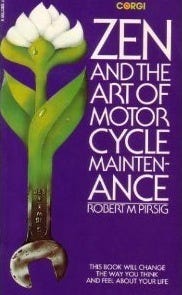Phydrious in the Book Zen and the Art of Motorcycle Maintenance
Book review: Zen and the Fine art of Motorcycle Repair, by Robert M. Pirsig

I've seen this kind of thing before at academy, where an academic (who unremarkably has Asperger's or Autism) drills down so intensely into their subject that they think it is absolutely the most important thing on World. They lose proportionality. The individual and so reaches the boundary where brilliance becomes madness and no i understands what they are talking about. For example, in microcosm, I was told by an eye-witness to a classic example of this behaviour that when the planes flew into the towers, they shut of the power filigree to most of New York. An Asperger'southward Syndrome academic at Southampton who believed people were just some other form of article of furniture was jumping up and down with frustration that he couldn't ship his fax through because his stance (almost retail) was the near of import subject area in New York that day. He believed with no doubtfulness whatsoever that the metropolis had to put all other considerations bated, turn the power back on and receive his piece of newspaper, then the humans could become dorsum to whatever other nonsense they were up to.
The other thing these people practise is compulsively count, catalogue and (in essence) line up their pencils and socks in orders of classification. In some cases, exterior of their piece of work they selection a hobby to fixate on, in this case motorcycle maintenance but it could be anything. I heard of one who spent twoscore years classifying woodlice. I retrieve this isn't nigh the world needing woodlice to be classified or respecting them for doing the work. I recollect information technology'south a personal reaction to universal chaos past taking a tiny function of the whole motion-picture show which that person can control and so feeling a lot safer. The fear of the fax non being delivered was really the fear that chaos had won, which was all-important to the man. Control or insanity, devils and angels whispering from his shoulders, every infinitesimal of every day.
I realised pretty early on that the trail the protagonist is following to Phaedrus (Plato has a dialogue chosen The Phaedrus [wolf], c. 370 BC) and the guy on the motorbike were a split persona, then that was confirmed later into the volume when we find Phaedrus was destroyed by personality therapy — "They put a hotwire to my head, 'cos of the things I did and said" (John Lydon). Actually, it is pretty obvious because the motorbike guy intricately explains Phaedrus's specialist subject, conflicts in philosophy, and must have extensive background reading in the bailiwick in order to cross reference the schools of idea and leading exponents, then they share identical influences (Occam's razor would say…). He also delivers Phaedrus's unformed and unpublished thesis on the nature of Quality, using his hobby as an object lesson to demonstrate his over-arching conclusions. The author then has the airs to tell us their IQ is and so high just one person per 50,000 has information technology. Oh, so that pre-emptively dismisses any criticism of your volume then?
I think the master achievement of the book is how it convinces the reader that the writer's specialist discipline and comprehension of ideals are very important. It's similar me convincing y'all that kite-flight is vital to the time to come of this planet. Okay, I take you tin can't count/measure out/classify beauty or quality and I accept that they both be and I would detect the difference if they were absent simply… then what? Lots of things don't take energy and mass, can't be weighed or photographed but we do see their influence and accept they be. Information technology's simplistic to think science puts them in the 'ghost' category. Aye, if y'all claim quality doesn't exist because it can't exist isolated, but then there would be no deviation at all between art and crap fine art. These things aren't objects or constructs but they are there, merely similar an upset mood is at that place even if the person's face up doesn't register information technology. We're being told something we already know.
There are too many coincidences, so I think this book (1975) was read past Douglas Adams and influenced the Hitchhiker's Guide to the Galaxy (1978). Non only does HHG contain an obvious reference to this in "Zen and the Art of Going to the Lavatory, by the Asgoths of Kria", plus both novels have stories with philosophy mixed in, but the motor cyclist narrator in this packs rain gear, insect repellent, a towel and a copy of Chilton's Motorcycle Troubleshooting Guide for his journeying. In HHG, it was wet weather gear, insect repellent, a towel and the Hitchhiker'due south Guide. On the philosophical angle, at the moment of the discovery of the Infinite Improbability Drive, I retrieve that Phaedrus (from this novel) was the model for the student left to sweep up the lab after a particularly unsuccessful party, who finds himself reasoning this manner… Also, the tag line "This book volition change the mode y'all think and experience virtually life" comes up once again in Douglas Adams' book The Meaning of Liff, which says on the cover "This volume volition change your life" (the definition of Liff). I retrieve no one has ever spotted this connexion earlier me.
It's a fun journey but doesn't get five stars I'm afraid because it isn't amazing to hear that motorcycles piece of work meliorate with some care and attention, the author is the centre of interest of his ain world, so the philosophical bottom line is, well, … so what? Information technology is of import to read this before you dice only do try to proceed it in perspective. Cheers for the vacation though.
johnsonouteriesself02.blogspot.com
Source: https://havingfaith.medium.com/book-review-zen-and-the-art-of-motorcycle-repair-by-robert-m-pirsig-c83988aade08
0 Response to "Phydrious in the Book Zen and the Art of Motorcycle Maintenance"
Post a Comment